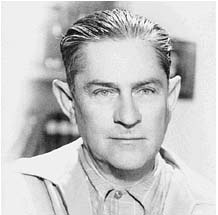 |
 |
 |
 Entertainment | March 2007 Entertainment | March 2007  
'Revolution Trilogy' of 'Mexican John Ford' Comes to DVD
 John Beifuss - scrippsnews.com John Beifuss - scrippsnews.com


| Films by Fernando de Fuentes

1933 Su última canción
. El prisionero trece
. La Calandria
. El Tigre de Yautepec
. El Compadre Mendoza

1934 El fantasma del convento
. Cruz Diablo

1935 Vámonos con Pancho Villa
. La familia Dressel

1936 Las mujeres mandan
. Allá en el Rancho Grandebr>
1937 La Zandunga

1938 La casa del ogro

1939 Papacito lindo/ˇEl viejo verde!

1940 El jefe maximo
. Creo en Dios/Secreto de confesión

1941 La gallina clueca |
Fernando de Fuentes once said: "Mexican cinema ought to be a faithful reflection of our severe and tragic way of being, not a poor imitation of Hollywood."

De Fuentes (1894-1958) was one of the most important directors in Mexico during the early decades of sound, the so-called "Golden Age of Mexican Cinema." Even so, his movies are all but unknown in the U.S.

The reason for the director's neglect here isn't hard to figure out: his movies have been very hard to see, at least north of the U.S./Mexico border.

That situation changes this week with Facet Video's release on DVD of what are supposed to be three of the director's most significant films, the movies that comprise his "Revolution Trilogy": "Prisoner 13" (1933), "El Compadre Mendoza" (1933) and "Let's Go with Pancho Villa!" (1934).

The movies are available separately (list-priced at $24.95 each) or packaged together in a box set ($49.95). The DVD's (which contain very few bonuses) may particularly interest world film buffs, students of Westerns and anyone interested in the movie heritage of a country currently enjoying a high profile, thanks to the prominence of such Mexican directors as Alfonso Cuaron ("Children of Men"), Guillermo del Toro ("Pan's Labyrinth") and Alejandro Gonzalez Inarritu ("Babel").

A.O. Scott of The New York Times has called de Fuentes "the Mexican John Ford," but from the evidence here he seems more a precursor to Sam Peckinpah, not just because his banditos and generales and sombrero-wearing cowboys remind us of Peckinpah characters but because de Fuentes' films seem quite modern in their rueful cynicism and dark denouements.

These films are unsentimental and uncompromising, and they must have seemed almost threatening in the context of Mexico's macho post-revolutionary culture. During the opening credits of "Pancho Villa," de Fuentes places his name over an image of a pistol: The juxtaposition not only tells us who's calling the shots but it's deeply ironic _ the ploy of a trickster who takes shoots with a camera instead of a gun to expose the folly and tragedy of violence.

The social and political context of the films in the "Revolution Trilogy" would have been as familiar to Mexican audiences of the 1930s as the Civil War was to U.S. audiences, but de Fuentes' films carried greater urgency and timeliness: The Mexican Revolution, which began in 1910, didn't end until about 1921, and bloody skirmishes continued until 1929. The freshness is one reason de Fuentes sometimes ran afoul of government censors, who demanded that the original, downbeat ending of "Prisoner 13" be changed so the movie would not encourage anti-military sentiment.

"Prisoner 13" ("El Prisionero 13") stars Alfredo del Diestro as an alcoholic Army colonel whose hard line stance against subversives results in the unjust arrest of a young man who _ unbeknownst to the colonel _ is the son he hasn't seen in years.

Del Diestro returns as the title character in "El Compadre Mendoza," the story of an opportunistic rancher who works both sides of the revolutionary fence. Like a reckless bachelor wooing two women on alternate nights in a screwball sex comedy, Mendoza plays the convivial host to both the government's soldiers and Emiliano Zapata's rebels, depending on who's passing through the neighborhood. Eventually, his moral compromises lead to tragedy.

"Let's Go with Pancho Villa!" ("Vamonos con Pancho Villa") apparently is regarded by many as de Fuentes' best feature, and one of the great achievements in Mexican film history.

The movie begins with an elaborate text introduction: "This film is an homage to the loyalty and courage Francisco Villa infused in the warriors who followed him," the words onscreen state. "The blame for the cruelty that occurred cannot be put on any group of people. For remember, this was an age which bathed in blood not only the hills of Mexico but also a field called Flanders and the peaceful valleys of France." Despite such hedging, the film looks at patriotism and nationalism with the narrowed eyes of a skeptic, not a compromiser, as six smalltown friends who call themselves the "San Pedro Lions" enlist with Pancho Villa's revolutionaries.

Embraced by the pith-helmeted Villa as "Pancho's Dorados" (his "Golden Ones"), the brave lions distinguish themselves in battle but meet increasingly pointless, accidental, ugly and unheroic deaths. As with "Prisoner 13," the movie's original ending was a casualty of the government censors; this brutal alternate ending is included as a bonus on the DVD.

These DVD's reportedly were made from the best available prints of the movies, but due to the woeful state of film preservation in Mexico in decades past, the films are somewhat beat up.

For more, visit www.facets.org | 
 | |
 |



